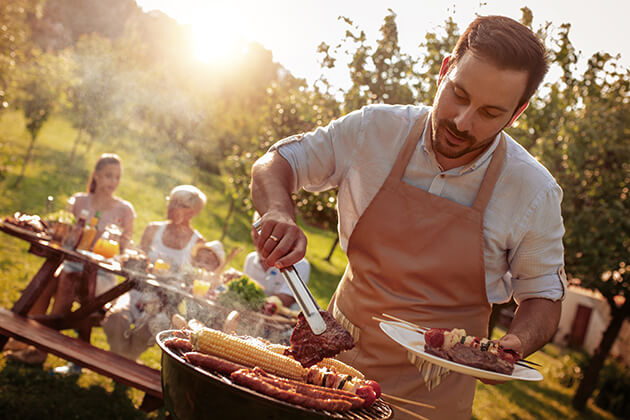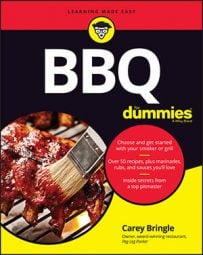 ©Ivanko80 / Adobe Stock
©Ivanko80 / Adobe Stock- Take time to prepare. Even the best BBQ cooks sometimes forget to prepare, and that can cause frustration once you throw the food on the fire. Do yourself a favor and make a list. Make sure you have enough fuel and the right tools, like tongs, gloves, grill brushes, basting liquid, spray bottle, and anything else you think you might need while cooking.
-
Organize your grill space. Set up a small table next to the grill with all your ingredients, utensils, serving platters, and so on. Grilling can proceed quickly, and so you have to be ready to serve food when it's at its peak.
- Practice patience with your fire. Never put food on a grill that isn't ready. Be sure to take your time getting the fire going, making sure that the coals are uniformly ashy gray. And remember that not all foods take well to the same fire or the same temperatures. Check your recipe or your grill manual to find out what temperature you need for each type of food.
-
Flavor your food. Grilling a hamburger, a steak, or some fish on the grill is simple and wonderful all on its own. But to add flavor to the food and seal that flavor in is the mark of a master griller. Marinating, which is a liquid flavor enhancer, adds moisture and is great for almost all foods. Oils are great for keeping delicate foods moist on the grill, and rubs help create a nice crispy crust.
-
Don't skimp on fuel. Be sure to build a fire that won't lose its heat before you finish grilling. This is especially important with a charcoal grill. Even though you can always replenish your coals, it's better to use too many than not enough. Just remember to spread the coals about 2 inches beyond the edges of the food, and if you do replenish the coals, you must wait until they turn ashen gray — usually about 20 minutes — before you get back to your ideal heat.
-
Police the fire! A fire changes constantly and demands your attention at all times. At the beginning of the heating process, coals will glow and have a flame above them. When you add food, you'll likely have a small to large flare-up, so monitor the cooking closely at that time. If you leave the grill with fire licking the sides of the food, you may come back to a charred meal.
Later on, when the fire has died down, you want to maintain a consistent heat so the food cooks evenly. Replenishing the coals if they start to lose their glow and diminish in size is usually necessary at least once. You may need to replenish more times throughout a long cooking time.
-
Check food often for doneness. Unfortunately, overcooked food doesn't have a reverse gear to take it back to rare, and an overdone piece of meat is a crying shame. So be sure to hover over your grill and check the food often. To test for doneness, make a small cut in the center of the food so you can peek inside. Test frequently for doneness a few minutes before the end of the estimated cooking time. Use an instant-read thermometer for thick chops, roasts, and whole poultry.
You should also gauge the searing on the outside of the food. Some folks love a black char and others prefer a light one. However, if you let the fire flare up too much, you may just get a coal-black exterior and a blood-rare interior.

